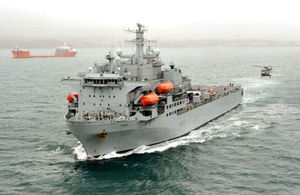RFA Argus honoured as she completes Sierra Leone deployment
RFA Argus has been honoured by the Defence Secretary as she heads back to the UK after supporting the fight against Ebola.

Royal Fleet Auxiliary RFA Argus on operations in Sierra Leone
The Royal Fleet Auxiliary ship deployed to Sierra Leone from Falmouth in September. Her task was to provide vital aviation support and medical capability to the Department for International Development-led effort against Ebola.
The ship’s three Merlin helicopters from 820 Naval Air Squadron and detachment of Royal Marines from 1 Assault Group Royal Marines helped deliver much-needed equipment, supplies and food packages to remote areas of Sierra Leone over six months.
In recognition of her contribution to operations in Sierra Leone and deployments spanning back to 1982, the Defence Secretary and Chairman of the Admiralty Board, Michael Fallon MP, has awarded Argus an Admiralty Board Letter of Commendation.
The commendation is extremely rare. The last similar award was made in 1939 to the family of Captain Edward Kennedy, who was killed when his ship HMS Rawalpindi was sunk following heroic action against the German Battleships Scharnhorst and Gneisenau. It is believed that this is the first time this award has been granted to an operational unit.
Defence Secretary, Michael Fallon, said:
During her deployment to Sierra Leone Argus has made a significant contribution to the UK’s effort to halt the spread of Ebola. She has helped to establish the crucial medical treatment centres and has provided vital transport capability allowing medical workers to reach the areas most affected by the disease and by providing medical reassurance to the British personnel deployed to the region.
As the Chairman of the Admiralty Board it gives me great pleasure to award RFA Argus with a Letter of Commendation, recognising her overall contribution to Defence over her 33 years’ service. From delivering helicopters and Harrier jets to the Falklands conflict in 1982, to acting as a casualty receiving ship in the first Gulf War in 1991 and Adriatic in 1993, Argus has made her mark in a significant way.
The Commanding Officer of RFA Argus, Captain David Buck, said:
I am extremely proud of everything that Argus and her people have contributed to the mission in Sierra Leone over the past six months. The award of the Admiralty Board Commendation for Argus’ lifetime contribution to defence is a huge honour that I am privileged to accept on behalf of all of those who have served in her over the course of 33 years service.
While Argus departs Sierra Leone, the UK mission is far from over. The UK remains committed to the fight against Ebola and with the return of RFA Argus, the number of military personnel in Sierra Leone will be at around 300. This contribution is made up of command and control, logisticians, planners and medics. Argus’ capabilities have been transferred to other agencies which are well placed to take on the roles.
Brigadier Andrew Hughes, Commander of UK Ebola Task Force, said:
RFA Argus arrived in Sierra Leone during the difficult days when cases of Ebola were rising and above 500 cases per week. Speed was of the essence in building the capacity of the country to deal with the outbreak. This included the building of Ebola Treatment Centres and importantly Command and Control functions. The ability of RFA Argus to move people and equipment by helicopter and boat has been very important to achieving this and it has enabled development of the operation both nationally and in the districts.
Now cases are much lower. The UK Task Force HQ is focussed on the vital work in support of DFID, rooting out remaining cases and helping to mobilise the Sierra Leone people to avoid spreading the disease as we work towards reaching zero cases. The capabilities RFA Argus brought here are either no longer required or have been replaced by other options. She is free to return to the UK for a well earned rest, as we remain to continue the fight.
International Development Secretary, Justine Greening, said:
RFA Argus has been an essential part of Britain’s response to Ebola in Sierra Leone. Today it leaves a country which is getting to grips with this crisis. The number of new weekly Ebola cases has dropped from nearly 500 in November to just 33 this week.
But our job is far from finished. One single case left unchecked is enough to cause a resurgence in the disease. Britain will continue to stand alongside the people of Sierra Leone as they fight to bring the number of cases down to zero.